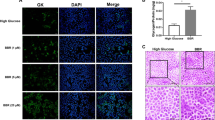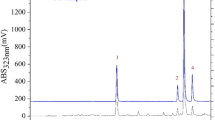Abstract
Berberine (BBR), a bioactive compound isolated from Coptidis Rhizoma, possesses diverse pharmacological activities including anti-bacterial, anti-inflammatory, antitumor, hypolipidemic, and anti-diabetic. However, its role as an anti-diabetic agent in animal models of dexamethasone (Dex)-induced diabetes remains unknown. Studies have shown that natural compounds including aloe, caper, cinnamon, cocoa, green and black tea, and turmeric can be used for treating Type 2 diabetes mellitus (DM). Compared to conventional drugs, natural compounds have less side effects and are easily available. Herein, we studied the anti-diabetic effects of BBR in a mice model of Dex-induced diabetes. HepG2 cell line was used for glucose release and glycogen synthesis studies. Cell proliferation was measured by methylthiotetrazole (MTT) assay. For animal studies, mice were treated with Dex (2 mg/kg, i.m.) for 30 days and effect of BBR at the doses 100, 200, and 500 mg/kg (p.o.) was analyzed. Glucose, insulin, and pyruvate tests were performed for evaluating the development of the diabetic model. Echo MRI was performed to assess the fat mass. Further, to elucidate the mechanism of action of BBR, mRNA expression of genes regulating gluconeogenesis, glucose uptake, and glycolysis was analyzed. In vitro BBR had no impact on cell viability up to a concentration of 50 μM. Moreover, BBR suppressed the hepatic glucose release and improved glucose tolerance in HepG2 cells. In vivo, BBR improved glucose homeostasis in diabetic mice as evidenced by enhanced glucose clearance, increased glycolysis, elevated glucose uptake, and decreased gluconeogenesis. Further, Dex treatment increased the total fat mass in mice, which was ameliorated by BBR treatment. BBR improves glucose tolerance by increasing glucose clearance, inhibiting hepatic glucose release, and decreasing obesity. Thus, BBR may become a potential therapeutic agent for treating glucocorticoid-induced diabetes and obesity in the future.








Similar content being viewed by others
Data availability
The original contributions presented in the study are included in the article/supplementary material; further inquiries can be directed to the corresponding author.
References
Chen W, Miao Y-Q, Fan D-J, Yang S-S, Lin X, Meng L-K, Tang X (2011) Bioavailability study of berberine and the enhancing effects of TPGS on intestinal absorption in rats. AAPS PharmSciTech 12(2):705–711
Chen J, Yan X, Kim KT, Kim SH, Lee E-S, Lee YK, ... Cho CW (2013) Comparative pharmacokinetics of berberine after oral administration of pure berberine, coptidis rhizoma extract, and decoctions of two different complex herbal formulas to rats. Bull Korean Chem Soc 34(5):1559–1562
Donnelly KL, Smith CI, Schwarzenberg SJ, Jessurun J, Boldt MD, Parks EJ (2005) Sources of fatty acids stored in liver and secreted via lipoproteins in patients with nonalcoholic fatty liver disease. J Clin Investig 115(5):1343–1351
Fathallah N, Slim R, Larif S, Hmouda H, Ben Salem C (2015) Drug-induced hyperglycaemia and diabetes. Drug Saf 38(12):1153–1168
Feng X, Wang K, Cao S, Ding L, Qiu F (2021) Pharmacokinetics and excretion of berberine and its nine metabolites in rats. Front Pharmacol 11:594852
Filippopoulou F, Habeos GI, Rinotas V, Sophocleous A, Sykiotis GP, Douni E, Chartoumpekis DV (2021) Dexamethasone administration in mice leads to less body weight gain over time, lower serum glucose, and higher insulin levels independently of NRF2. Antioxidants 11(1):4
Gholap S, Kar A (2005) Gymnemic acids from Gymnema sylvestre. Potentially regulates dexamethasone-induced hyperglycemia in mice. Pharm Biol 43(2):192–195
Gupta AP, Singh P, Garg R, Valicherla GR, Riyazuddin M, Syed AA, ... Gayen JR (2019) Pancreastatin inhibitor activates AMPK pathway via GRP78 and ameliorates dexamethasone induced fatty liver disease in C57BL/6 mice. Biomed Pharmacother 116:108959
Haber RS, Weinstein SP (1992) Role of glucose transporters in glucocorticoid-induced insulin resistance: GLUT4 isoform in rat skeletal muscle is not decreased by dexamethasone. Diabetes 41(6):728–735
Han Y, Xiang Y, Shi Y, Tang X, Pan L, Gao J, ... Lai X (2021) Pharmacokinetics and pharmacological activities of berberine in diabetes mellitus treatment. Evid Based Complement Alternat Med 2021:1–15
Huang Q, Chen L, Teng H, Song H, Wu X, Xu M (2015) Phenolic compounds ameliorate the glucose uptake in HepG2 cells’ insulin resistance via activating AMPK: anti-diabetic effect of phenolic compounds in HepG2 cells. J Funct Foods 19:487–494
Ilyas Z, Perna S, Al-Thawadi S, Alalwan TA, Riva A, Petrangolini G, ... Rondanelli M (2020) The effect of berberine on weight loss in order to prevent obesity: a systematic review. Biomed Pharmacother 127:110137
Kwon M, Lim DY, Lee CH, Jeon J-H, Choi M-K, Song I-S (2020) Enhanced intestinal absorption and pharmacokinetic modulation of berberine and its metabolites through the inhibition of P-glycoprotein and intestinal metabolism in rats using a berberine mixed micelle formulation. Pharmaceutics 12(9):882
Laakso M, Malkki M, Deeb SS (1995) Amino acid substitutions in hexokinase II among patients with NIDDM. Diabetes 44(3):330–334
Leclercq IA, Morais ADS, Schroyen B, Van Hul N, Geerts A (2007) Insulin resistance in hepatocytes and sinusoidal liver cells: mechanisms and consequences. J Hepatol 47(1):142–156
Lee KS, Kim SK (2013) Direct and metabolism-dependent cytochrome P450 inhibition assays for evaluating drug–drug interactions. J Appl Toxicol 33(2):100–108
Leng S-H, Lu F-E, Xu L-J (2004) Therapeutic effects of berberine in impaired glucose tolerance rats and its influence on insulin secretion. Acta Pharmacol Sin 25(4):496–502
Li J, Li J, Ni J, Zhang C, Jia J, Wu G, ... Wang S (2022) Berberine relieves metabolic syndrome in mice by inhibiting liver inflammation caused by a high-fat diet and potential association with gut microbiota. Front Microbiol 12:752512
Liu C-S, Zheng Y-R, Zhang Y-F, Long X-Y (2016) Research progress on berberine with a special focus on its oral bioavailability. Fitoterapia 109:274–282
Matsuda M, DeFronzo RA (1999) Insulin sensitivity indices obtained from oral glucose tolerance testing: comparison with the euglycemic insulin clamp. Diabetes Care 22(9):1462–1470
Matthews DR, Hosker J, Rudenski A, Naylor B, Treacher D, Turner R (1985) Homeostasis model assessment: insulin resistance and β-cell function from fasting plasma glucose and insulin concentrations in man. Diabetologia 28(7):412–419
Meng Z, Yu Y, Zhang Y, Yang X, Lv X, Guan F, ... Chen L (2020) Highly bioavailable berberine formulation improves glucocorticoid receptor-mediated insulin resistance via reduction in association of the glucocorticoid receptor with phosphatidylinositol-3-kinase. Int J Biol Sci 16(14):2527
Mills E, Devendra S (2015) Steroid-induced hyperglycaemia in primary care. London J Prim Care 7(5):103–106
Mosmann T (1983) Rapid colorimetric assay for cellular growth and survival: application to proliferation and cytotoxicity assays. J Immunol Methods 65(1–2):55–63
Peng W-H, Wu C-R, Chen C-S, Chen C-F, Leu Z-C, Hsieh M-T (2004) Anxiolytic effect of berberine on exploratory activity of the mouse in two experimental anxiety models: interaction with drugs acting at 5-HT receptors. Life Sci 75(20):2451–2462
Postic C, Dentin R, Girard J (2004) Role of the liver in the control of carbohydrate and lipid homeostasis. Diabetes Metab 30(5):398–408
Vegiopoulos A, Herzig S (2007) Glucocorticoids, metabolism and metabolic diseases. Mol Cell Endocrinol 275(1–2):43–61
Wei X-C, Zhu L-Q, Wang C-G (2015) Efficacy and safety of berberine in patients with type 2 diabetes mellitus: a meta-analysis. Chin Herb Med 7(4):344–353
Xia X, Yan J, Shen Y, Tang K, Yin J, Zhang Y, ... Weng J (2011) Berberine improves glucose metabolism in diabetic rats by inhibition of hepatic gluconeogenesis. PLoS One 6(2):e16556
Xu J, Christian B, Jump DB (2006) Regulation of rat hepatic L-pyruvate kinase promoter composition and activity by glucose, n-3 polyunsaturated fatty acids, and peroxisome proliferator-activated receptor-α agonist. J Biol Chem 281(27):18351–18362
Yin J, Xing H, Ye J (2008) Efficacy of berberine in patients with type 2 diabetes mellitus. Metabolism 57(5):712–717
Zhang H, Wei J, Xue R, Wu J-D, Zhao W, Wang Z-Z, ... Wang Y-M (2010) Berberine lowers blood glucose in type 2 diabetes mellitus patients through increasing insulin receptor expression. Metabolism 59(2):285–292
Zhang M, Lv X, Li J, Meng Z, Wang Q, Chang W, ... Liu Y (2012) Sodium caprate augments the hypoglycemic effect of berberine via AMPK in inhibiting hepatic gluconeogenesis. Mol Cell Endocrinol 363(1–2):122–130
Zhao L, Li W, Han F, Hou L, Baillargeon J-P, Kuang H, ... Wu X (2011) Berberine reduces insulin resistance induced by dexamethasone in theca cells in vitro. Fertil Steril 95(1):461–463
Funding
This study was supported by the Indian Council of Medical Research, New Delhi India (Grant No. 45/67/2018-BMS/PHA/OL).
Author information
Authors and Affiliations
Contributions
MG and SP conceived the presented idea and planned the experiments. SP verified the analytical methods and supervised the findings of this work. MG, MR, and BS designed the model, carried out the experiments, and analyzed the data. MG wrote the manuscript with input from all authors. MR contributed to sample preparation and the interpretation of the results. MG and MR contributed to implementation of the research, to the analysis of the results, and to the writing of the manuscript. MG, BS, SP, and MR drafted the manuscript and designed the figures. SP and AM were involved in planning and supervised the work. SP and AM were in charge of overall direction and planning. All authors provided critical feedback and helped shape the research, analysis, and manuscript preparation. All authors approved the manuscript for submission. The authors declare that all data were generated in-house and that no paper mill was used.
Corresponding author
Ethics declarations
Ethical approval
The study was approved by the Institutional Animal Ethics Committee of the King George’s Medical University (KGMU), Lucknow, India (No. 101/IAEC/2018).
Consent for publication
All authors have read and approved the manuscript for submission.
Conflict of interest
The authors declare no competing interests.
Additional information
Publisher's Note
Springer Nature remains neutral with regard to jurisdictional claims in published maps and institutional affiliations.
Rights and permissions
Springer Nature or its licensor (e.g. a society or other partner) holds exclusive rights to this article under a publishing agreement with the author(s) or other rightsholder(s); author self-archiving of the accepted manuscript version of this article is solely governed by the terms of such publishing agreement and applicable law.
About this article
Cite this article
Gupta, M., Rumman, M., Singh, B. et al. Berberine ameliorates glucocorticoid-induced hyperglycemia: an in vitro and in vivo study. Naunyn-Schmiedeberg's Arch Pharmacol 397, 1647–1658 (2024). https://doi.org/10.1007/s00210-023-02703-2
Received:
Accepted:
Published:
Issue Date:
DOI: https://doi.org/10.1007/s00210-023-02703-2




